Editorial by Khmer Circle:
People can be so gullible, or lazy sometimes. "Fuelled by a sense of debt from its civil war..."?
Cambodia as a nation has that sense of debt and gratitude, but this UN peace-keeping presence or contribution from a country that has [under its current leadership] done its best to undermine the spirit of that international intervention in the 1990s, including pronouncing the Paris Peace Accords dead, steam-rolling independent media and democratic opposition voices or betraying the democratic principles, has very little to do with repaying that debt, but more with 'bribing' the UN with that presence by way of leveraging its influence on that body.
This is a pariah state that has consistently violated the basic rules of UN membership and its human rights Charters - just ask every past and current UN Special Rapporteur to the country, if in doubt. Even the 'PM' himself publicly casts doubt recently as to the possibility of Cambodia's seat at the UN being withheld - as is being called for by the now dissolved Opposition party - owing to the UN's reliance on that peace-keeping presence.
On the other hand, the Cambodian peace-keeping contingent means that some young men and women can be, at least, assured of a decent salary; a prospect that is far from being guaranteed in a national military service that is notorious for its widespread corruption and poor pay for ordinary servicemen and women. After all, the Phnom Penh regime does't think twice about sending the country's young men and women in the hundreds of thousands overseas in search of precarious job opportunities from where they often return home - if they are fortunate - bearing the scars of torture, rape, and many other shades of human cruelty.
&&&
Fuelled by a sense of debt from its civil war, Cambodia makes an outsized contribution to UN peacekeeping. Some of its forces have paid the ultimate price – while those who return must deal with the trauma alone
BY ERIN HANDLEYMECH DARA
3 JUN 2018
scmp
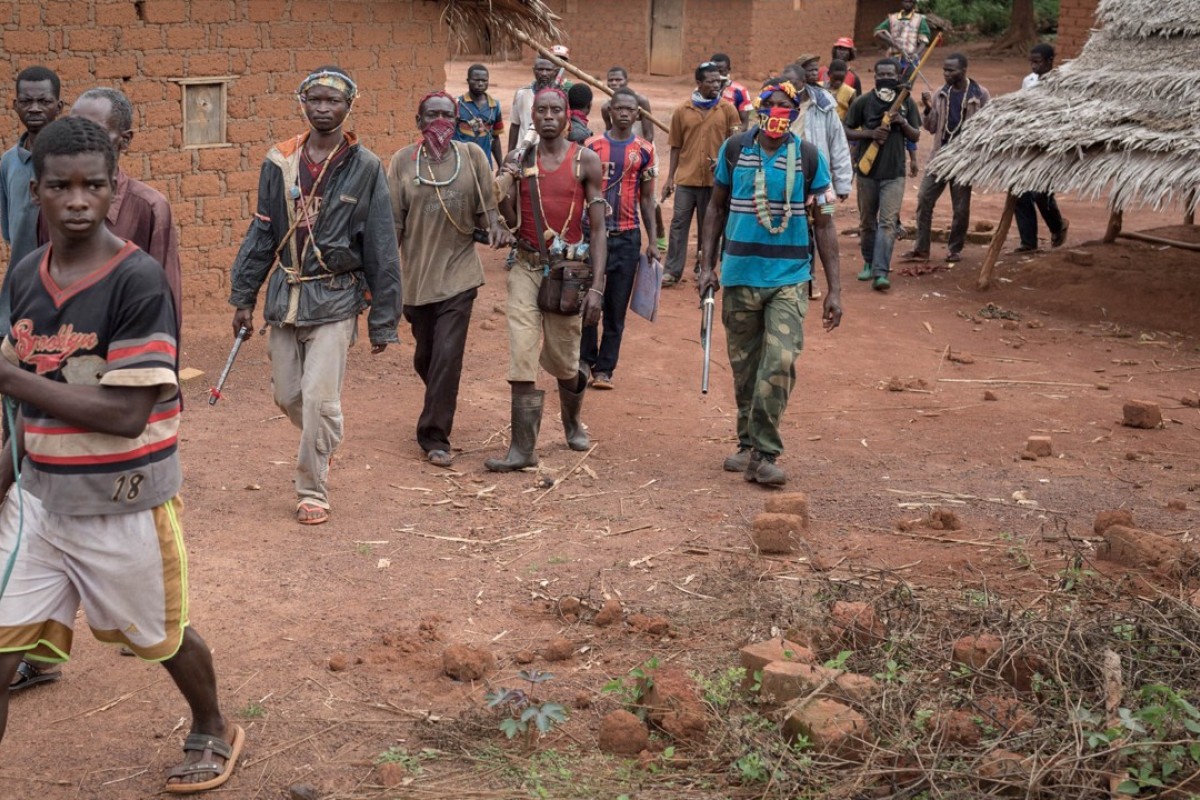
It was after nightfall when a spray of bullets raked the convoy of trucks carrying Cambodian peacekeeper Thuch Thim. He and his fellow blue helmets had been returning from building a road in the heart of the Central African Republic when they encountered a series of roadblocks set up by guerilla fighters. For hours, they negotiated, making it through the first two encounters unscathed. Then the shooting began.
The ambush by the Christian terrorist anti-Balaka group claimed the lives of four of Thuch Thim’s compatriots – the first Cambodians to die in combat during peacekeeping missions – and a Moroccan colleague. Those killed – Im Sam, Mao Eng, Seang Norin, and Mom Tola – were last week honoured with a posthumous award, along with 125 others who lost their lives in peacekeeping operations abroad.
The awards have served to highlight Cambodia’s outsized contribution to UN peacekeeping. Since 2006, the country has sent 5,257 troops on such missions. This month alone, that figure was 813, making it the 32nd-highest contributor – an astonishing ranking given the Southeast Asian nation is only 72nd in terms of total population. It’s a contribution Thuch Thim and others take pride in – many see it as a way of repaying the UN peacekeepers that once helped the kingdom as it emerged from civil war and the horrors of the Khmer Rouge.
As anti-US feeling grows in Cambodia, China cashes in
Dressed in military fatigues with his blood type stitched to his shirt, Thuch Thim has small, jagged, white scars on his left hand. He bites his lip and his eyes wrinkle when he discusses the fatal attack on May 8 last year.
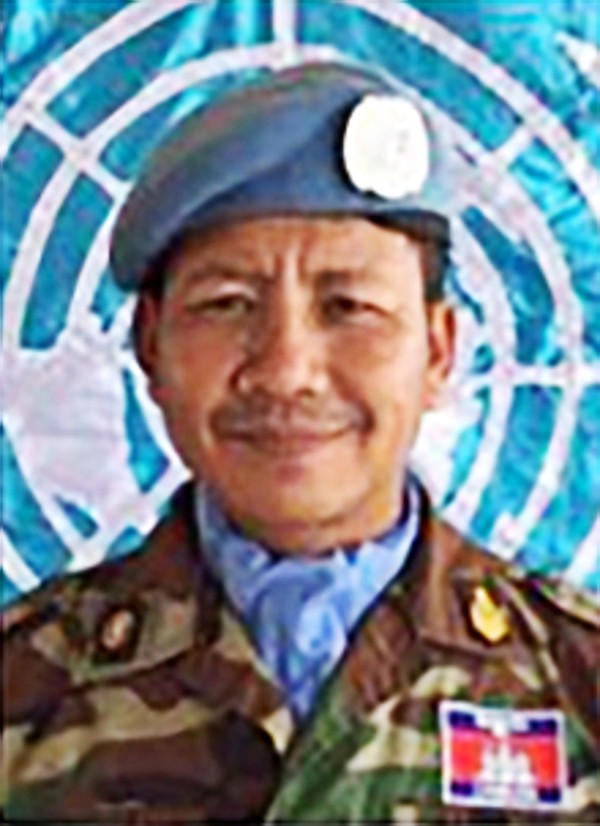
Thuch Thim Photo: Handout
After a day of road construction, Thuch Thim and a crew of about 20 people, with Moroccans providing security for Cambodian engineers and drivers, had been headed back to their UN headquarters when they were halted by a troupe of six guerillas at about 4.30pm.
“There was a negotiation and they opened the road and let us go,” he recalls.
It took five minutes, and his company wasn’t afraid. They had enough weapons to defend themselves and were trained for such situations. But 20km further down the road, they met another blockade – 10 people, with AK-47 rifles trained on their convoy. This negotiation lasted an hour before the peacekeepers were allowed to pass. The relief was short-lived. Another 5km on, they were ambushed.
Welcome to Asia’s newest one-party state
“The head of the rebels opened fire,” he says. “Shortly after the first bullet was fired, the rest of the rebels started spraying out bullets from the front [of the convoy] to the end. I felt I got hit, I felt the bleeding, the wet blood. I was thinking, there’s no way to stop, only move forward.”
Thuch Thim steered his vehicle out of the line of fire. He caught a glimpse of the truck in front of him – the light was on but it wasn’t moving. It’s a haunting image, the moment he realised someone had been killed. He ploughed ahead in his truck, overcoming a fallen tree trunk and forging a path for an ambulance in his wake.
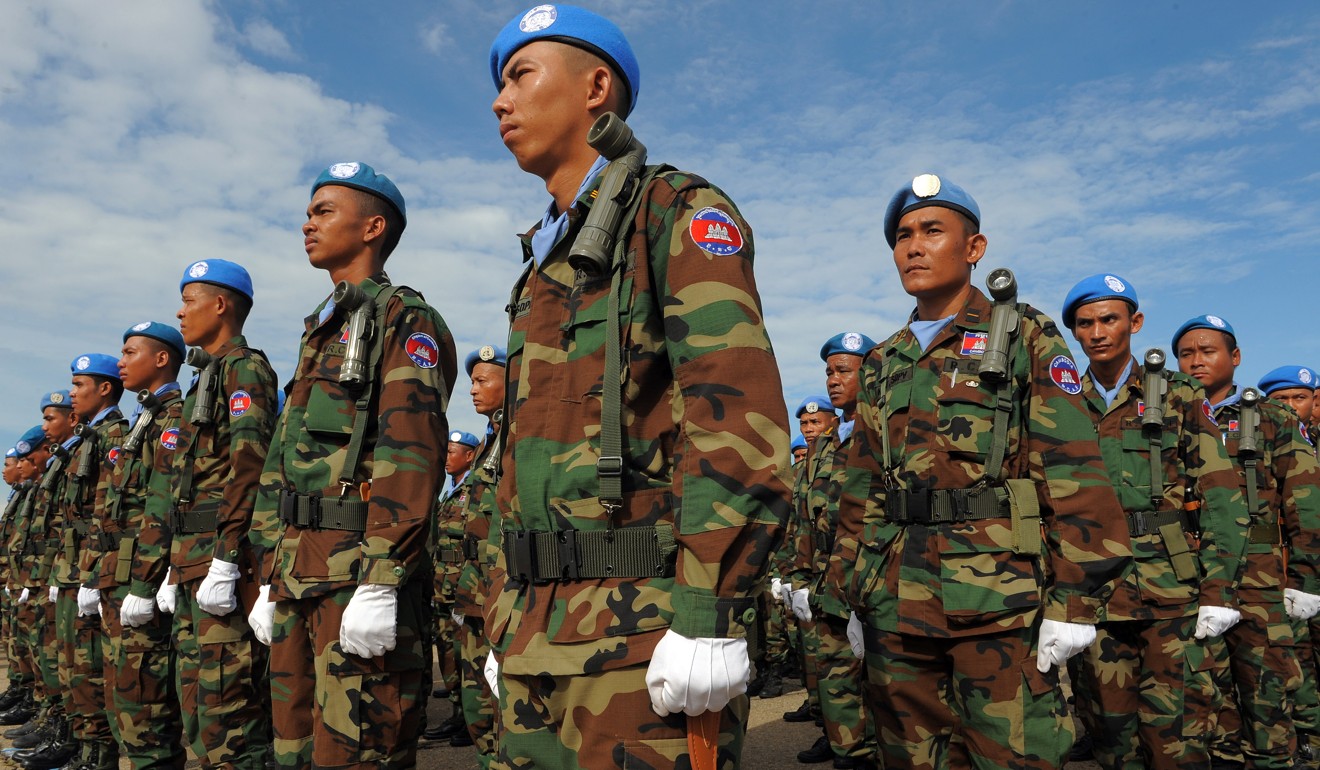
Cambodia has sent 5,257 troops to UN peacekeeping missions abroad. Photo: AFP
When he arrived back at the base, he was told a Cambodian soldier had been killed. Another three were missing. After a sleepless night, he learned they too had lost their lives.
“I knew them. We were all friends. We work together and eat and enjoy life together,” he says. “I feel regret, because we are friends in the same unit, and we share the same blood.”
Thuch Thim was flown back to Cambodia with the four corpses of his friends. His hand was pierced with shrapnel in the attack, fracturing a finger.
Thuch Thim became a soldier at 16 – the same age his oldest son is now – in the late 1980s, when Cambodia was still ravaged by civil war between Vietnamese-backed government forces and the Khmer Rouge guerillas.
Hun Sen counts on China as he cracks down in Cambodia – has he miscalculated?
In the 1990s, Cambodia hosted a flood of UN peacekeepers ahead of the kingdom’s first elections. For many Cambodians, as in other post-conflict and developing nations, it’s a debt they feel bound to repay.
“We send our armed forces under the UN umbrella because we hurt so much from the civil war in our country. Our position is very strong and very firm,” says defence ministry spokesman Chhum Socheat. “This is what Cambodia wants – to share how to contribute to peace and development. Our heart goes out to those who die, those innocent people who die.”
While Prime Minister Hun Sen has vowed to increase the number of peacekeepers sent to Africa and the Middle East, it appears that has not yet been brought into effect. At this time last year, Cambodia had slightly more peacekeepers deployed – 846.
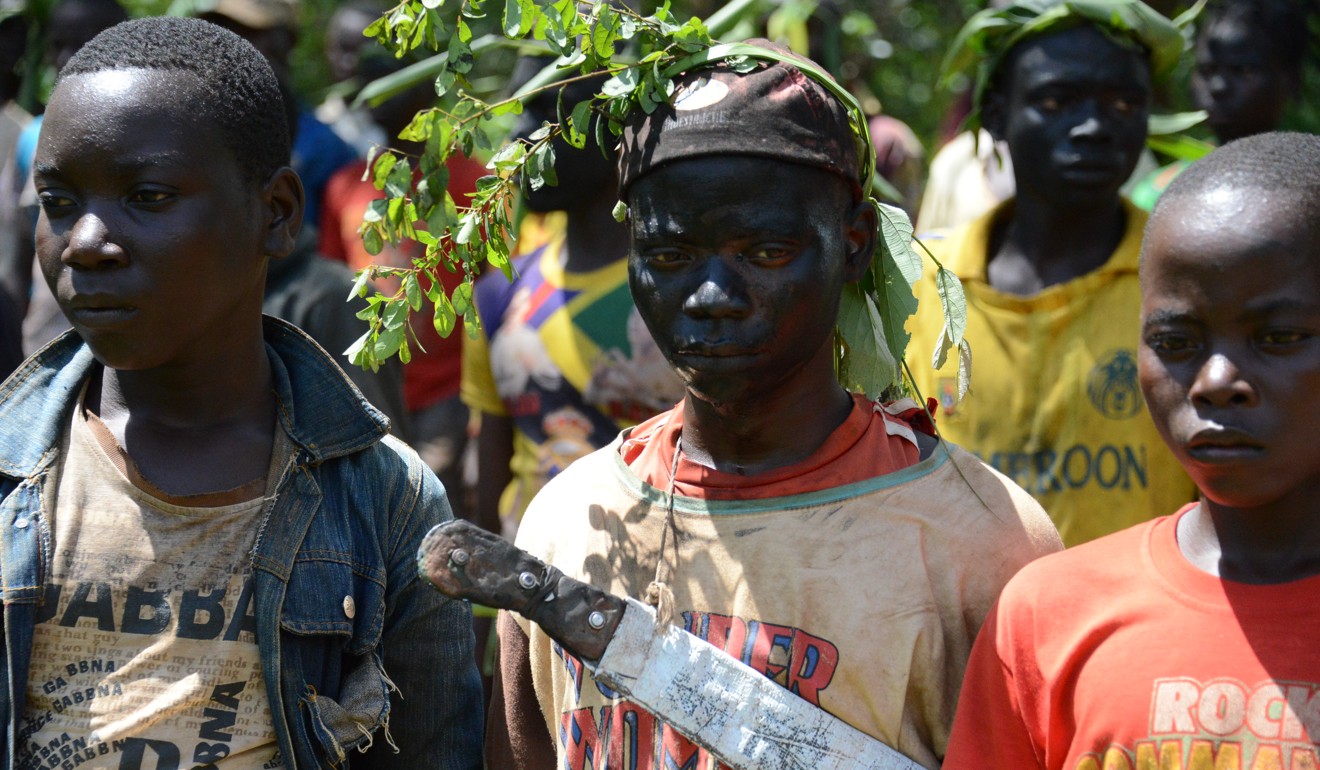
Young anti-Balaka young fighters during a training session. Photo: AFP
Besides the four killed in combat in the Central African Republic, another, Sergeant Luy Bunlong, died from complications stemming from malaria last year. Four Cambodian casualties have also been reported in Mali in recent years, with two dying from food poisoning, one from malaria and another in a sandstorm.
But there appears to be little, if any, post-traumatic stress disorder (PTSD) support for survivors serving in conflict-riven nations. Some defence officials, when asked about it, were not familiar with the term.
Even if PTSD is not spoken about, peacekeeping troops are likely to experience it on some level, according to Dr Chhim Sotheara, executive director at the Transcultural Psychosocial Organisation (TPO).
Troops returning from combat zones may feel survivor’s guilt, or fall victim to depression or PTSD, including flashbacks, nightmares or spiralling alcoholism, he says.
“We have never seen any peacekeeper at TPO but it is good for the surviving troops or commanders to know that sometimes PTSD or any trauma-related condition may not happen immediately after the event but they may suffer years later as it may be precipitated by another life event,” Chhim Sotheara says.
“They should undergo psychological process[es] such as stress debriefing or any sort of psychological management to help them prepare themselves to cope with those potential psychological problems.”
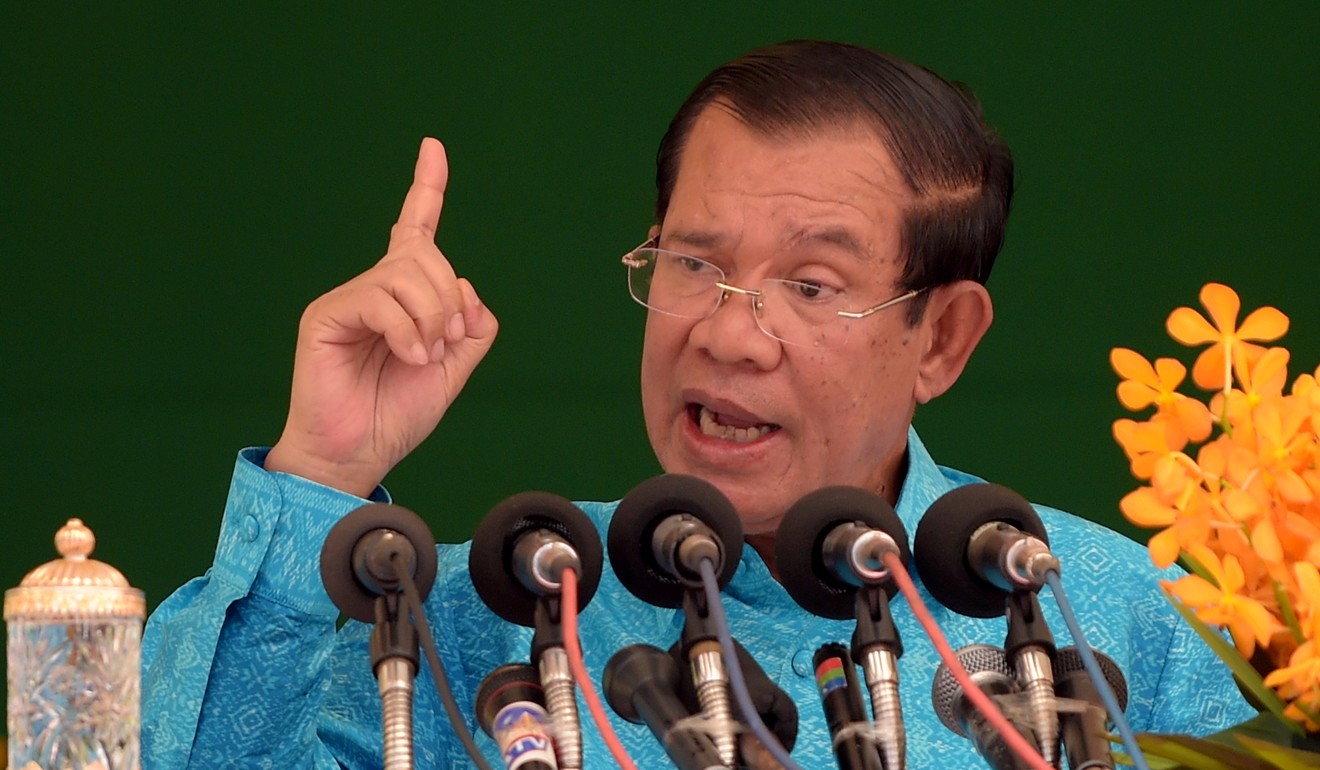
Hun Sen has vowed to increase the number of Cambodian peacekeepers deployed to Africa and the Middle East. Photo: AFP
Thuch Thim says while he feels regret and thinks of his deceased friends when asked about them, he doesn’t dwell on it and is not afflicted by nightmares or depression.
“You can see from your interview with Mr Thuch Thim … that he is still strong mentality and physically. Our peacekeeping forces do not have any problems with PTSD at all,” says Chhum Socheat, the defence ministry spokesman. “On the contrary our peacekeeping forces are very committed to protecting peace [and] security as well as contributing to the humanitarian activities under the UN umbrella.”
Thuch Thim, meanwhile, is in training for a new deployment. “When there’s an opportunity, I will go,” he says, even if it’s back to the Central African Republic. “We are coming to help find the peace for the people of [the republic]. We are not coming to destroy, we came to help.” ■

No comments:
Post a Comment